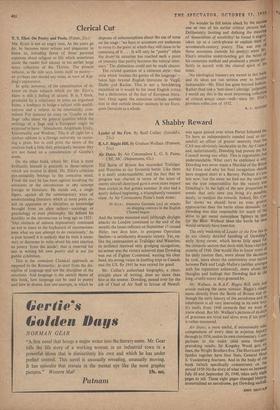A Shabby Reward
Air Dates. By Air Commodore L. G. S. Paine, CBE, MC. (Heinemann, 42s.) 13attle of Britain has succeeded Trafalgar and Waterloo as Our favourite battle. Like them it is easily understandable; and the fact that its progress was charted in terms of the score of enemy aircraft destroyed gave it even more impact than cricket in that golden summer. It also had a neatly defined beginning, a triumphantly resonant close. As Air Commodore Paine's book -notes : 10 JULY: Intensive Germain [sic] air attacks on shipping convoys in the English Channel began.
And the tempo mounted until (although daylight attacks on London continued to the end of the month) the losses inflicted on September 15 caused Hitler, two days later, to postpone Operation Sealion—a satisfactory dramatic victory. Yet, un- like the commanders at Trafalgar and Waterloo, its, architect received only grudging recognition; no sooner was the victory achieved than Dowding was out of Fighter Command, wasting his clear head, his strong vision in footling trips to Canada and the US. By 1941 he was retired for good.
Mr. Collier's authorised biography, a clean, straight piece of writing, does no more than hint at the answer. Dowding, passed over for the job of Chief of Air Staff in favour of Newall,
was again passed over when Portal followed on. To have so independently minded (and so suc- cessful) an officer of greater seniority than the CAS was obviously intolerable to the Air Council and, unfortunately, Dowding had proved the Air Council wrong too often. This is regrettable, but understandable. What can't be explained is whY, Dowding was never made a Marshal of the RoYal, Air Force and why his final recognition shook' have stopped short at a Barony. Perhaps it's to° late now; but the more we find out the more we see the true, responsibility for the victory was Dowding's. In the light of the new proportion to events that only time can bring it's possible, surely, to readjust the rewards. Indeed, Mr. Col- lier shows we should have an even greater appreciation than the battle alone demands; for Dowding was also responsible for much of the drive to get metal monoplane fighters in time for the Bliti. Without them the battle he Nvoa would certainly have been lost.
The only weakness of Leader of the Few lies in its too closely detailed handling of Dowding's early Army career, which leaves little space for the climactic section that deals with those vital kW months of 1940. One would like to know more of his daily routine then, more about the decisions he took, more about the controversy over tactics between Park and Leigh-Mallory (neither emerges with his reputation enhanced), more about the thoughts and feelings that Dowding had as the long, cruelly sunny days groaned by.
Mr. Wallace, in R.A.F. Biggin Hill, only just avoids making the same mistake. Biggin's magic stems directly from the Battle of Britain and al- though the early history of the aerodrome and its inhabitants is all very interesting in its own vvaY' it's really from 1940 onwards that we want to know about. But Mr. Wallace's pictures of its daYs of greatness are vivid and alive, even if his pros) is rather mannered.
Air Dates, a most useful, if occasionally odd, compendium of every date in aniation history through to 1956, makes its own commentary. Corn' parisons in the index yield some thought' .provoking results. Sir Kingsley Wood gets Si lines, the Wright Brothers five. The Hurricane an" Spitfire together have four lines, General Hoyt S. Vandenberg fourteen. And in the body of book (which specifically concentrates on the period 1939-56) the story of what went on between July 10 and September 30, 1940, takes only eight pages to tell. Those eight pages changed history, immortalised an aerodrome, got Dowding sacked'
JOHN msTcof


































 Previous page
Previous page